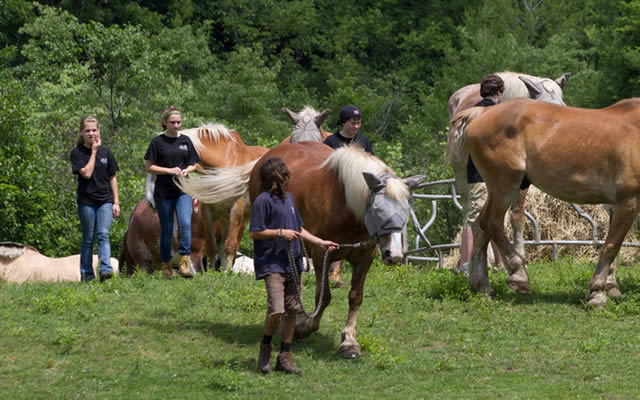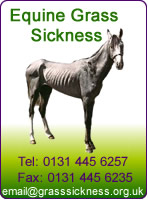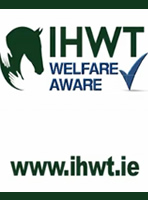
And photographs, if you have any.
Horseytalk.net Special Interview
Pamela A. Rickenbach
 Rescued draft horses prove they can still pull at equine M*A*S*H unit
Rescued draft horses prove they can still pull at equine M*A*S*H unit
The sprawling Blue Star sanctuary for draft horses in Palmer, Mass. is nothing short of an equine M*A*S*H unit.
There is big gray Charlie-Daniel, blind in his right eye but still hardy and game for a gig, and his pulling partner, Carter, who copes with tendinitis and arthritis.
There is towering Tom Too, 2,600 pounds of plow-pulling prowess, who was badly hobbled by a caved-in front hoof and wears a specially built shoe.
And big red Mark, who has asthma and indigestion and a touch of depression because he pines for a former teammate who recently passed on.
Standing nearby, content and solitary, is toothless Jesse, 31, who eats only mash, but plenty of it. And up strides convivial Bud, the farm mascot, who has epilepsy and needs drugs to stave off seizures but still noses into everyone’s business.
All told, there are 30 draft horses living at Blue Star - Belgians and Percherons, log-pullers and coach horses, even a miniature mining horse named Cupcake. Their personalities vary from prideful to needy, but they share one thing in common: They all would have been put down if not for Blue Star, the state’s sole rescue and rehab haven for veteran workhorses in need of a second career.
“These are the horses that helped build this country and this state for hundreds of years,’’ says Pamela A. Rickenbach, cofounder and director of Blue Star Equiculture, the nonprofit that gives sanctuary to the mighty animals. “They have partnered with humans for 6,000 years, doing everything we ask of them. We owe them far more than a short life and fast trip to a slaughterhouse.’’
Times are busy for Rickenbach and her cofounder, Christina Hansen, a full-time carriage driver in Philadelphia. A bad economy has left many of the nation’s one million workhorses homeless, unemployed, and facing slaughter for their meat. Sanctuaries abound for show horses, racehorses, and competition and companion horses, which number about 8.2 million across the country, according to the American Horse Council. But the nation’s one million draft horses - those that pull hay wagons, street carriages, farm carts, Budweiser barrels, and funeral biers - are more costly to feed, trickier to heal and manage, and worth more cash to the “kill buyers’’ who roam the equine auction circuit purchasing horseflesh by the pound, according to the Maryland-based Equine Welfare Alliance.
They also need work to stay happy. After thousands of years of breeding, draft horses are born to haul.
“These horses thrive on having a job to do,’’ Rickenbach says. “Horses who were frankly depressed from being left in a paddock have positively lit up in anticipation of going out to work again.’’
It is hard to argue with Rickenbach, who grew up in the Andes and the Amazon, survived tropical diseases and harsh living conditions, studied horticulture and Native American languages, and became a carriage driver in Philadelphia in 1990.
Tall and stately, warm-hearted and passionate, the 50-year-old mother of two is part equine evangelist, part horse whisperer. She calls the draft horse, “a forgotten national treasure,’’ and has recently partnered with the University of Massachusetts at Amherst to create the state’s first official certification program in draft-horse care, feeding, training, hitching, harnessing, husbandry, and driving. The program began this month at the university’s Hadley Farm and will continue through the coming school year.
“I was really impressed by the whole concept of rescuing draft horses and using them to train and educate New England farmers,’’ says Dr. Stephen R. Purdy, a veterinary professor and director of the farm. “Our valley is full of farms and these folks recall their grandparents working with horses and so they are very drawn to the tradition.’’
Joining Rickenbach and her small staff as they cope with the daily needs of 30 horses as different and temperamental as a roomful of teenagers is inspiring and exhausting. People pull up by the side of Route 181 all day to watch as the caregivers feed the animals from giant hay bales under an immense oak tree, walk them one by one around the paddock, hitch them to carts for exercise, clean their hooves, wipe them down, and feed each a special diet mixed every morning by retired firefighter Paul Moshimer.
Visitors and volunteers come and go, carrots and peppermints in hand. Equine massage therapist Jo Bunny gives the horses soothing rubdowns. Springfield teacher Lise Krieger brings her public school kids for an afternoon of romping and fresh air. Equine chiropractic doctor Bethany Bowman stands on a hay bale and adjusts the animals’ back and haunch joints. Judy Cockerton of the Treehouse Community brings her foster children by for a regular visit. Many have befriended specific horses and the animals greet them as familiar faces.
“You cannot underestimate the therapeutic value these horses have with the children,’’ Cockerton said. “They are a major boost to their self-esteem.’’

The horses have a fine spread - 129 acres at the Burgundy Brook organic farm, complete with roomy stables, work space for farriers and vets, five fenced paddocks, and direct access to a two-mile-long riverside pathway where the horses can get their pulling done. Opened two years ago, Blue Star has cared for more than 100 horses to date, many of them healed, refreshed, and sent on to new owners who are rigorously checked before they can adopt a charge.
“These horses are not lawn ornaments,’’ says Rickenbach. “They are professionals that have earned money for their owners and taught a lot of people how to drive a carriage. Their forerunners worked our farms and built our roads and cities and fought in our wars and carried us to our graves. To me, it is not so much what will become of the horses, but what will become of us if we ignore what they can do for society.’’
Many of the horses come from the streets of Philadelphia and New York City. Blue Star recently became the official retirement home for the New York Horse and Carriage Association. Others come from Amish farms or bankrupted fairgrounds or overwhelmed owners. And some, like Hope, are rescued from kill pens by advocates who use social networking to step in and outbid so-called “kill buyers.’’
Those buyers transport the horses, often under inhumane conditions, to Canada and Mexico for slaughter, according to the welfare alliance. Their meat is a delicacy in France and Japan, and consumed for protein across Central America.
As serious as they are about saving the draft horse, the Blue Star staff shows a fine sense of humor. They talk about “real horsepower’’ and “brown energy’’ (as in manure) and maintaining a “low carbon hoof print.’’ They are so bonded with their animals that they sometimes seem to share inside jokes. Little Cupcake, whose ancestors pulled coal carts underground, will stand right under a big horse like Bud to escape a rain shower, gazing back at Rickenbach as if to show how clever he is. Rickenbach talks to each animal intimately, and it is clear they know she is their herd leader and boss.
Blue Star is dreaming big about the future of draft horses as Americans turn to alternate energy through groups like the Northeast Organic Farming Association, which will hold animal-power field days and workshops in Amherst next month. The owners want to put draft horses back in the public eye and imagine new uses for them - performing organic agriculture, bringing water to urban gardens, collecting and transporting recycled materials, making short-haul deliveries. Massachusetts law still grants horses the right of way on state roads, and draft horses are acclimated to traffic and prefer walking on smooth asphalt to rutted trails.
“These horses really can deal with anything,’’ said Moshimer. “They are bred to work in all kinds of noise and activity. They are amazing. Powerful and gentle at once.’’
On Independence Day, two teams from Blue Star were brought to Mount Tom, in Holyoke, by the state Department of Conservation and Recreation to carry visitors up to the Victorian-era Old Eyrie House. The house was built in 1861, thanks to horses that cleared the roads and dragged the lumber, tools and workers needed at the summit. This time, the horses were there in place of two diesel buses, showing off their green might.
“This was a great environmental alternative, and we’ve drawn at least 100 extra people,’’ said Jim Terruso of the DCR, which has vetted Blue Star and made it an official state vendor for carriage rides. “I know these people and their horses. They treat them like children. They are extremely protective.’’
Between rides, two of the horses, Mark and Tom Too, stood by chomping on carrots and letting visitors stop by to admire and pat them. After a while, Mark pulled back from all the attention, needing some quiet time. Then along came Regina, a young girl with cerebral palsy who can barely move her hands and lies in a wheelchair.
“Bring her right up,’’ said Jo Bunny, who was handling Mark. Cautiously, Regina’s caregiver wheeled the child closer and closer, finally pushing her under Mark’s nose. The 2,200-pound workhorse bent low and kissed and licked the child’s arms. Regina grinned wide and laughed.
“Oh my God - get out!’’ said her caregiver. “She’s going to be talking about this forever.’’











